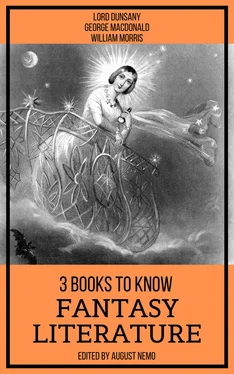All that day Alveric travelled, with the vigour that waits at the beginning of journeys, which helped him on though he was burdened with so much provisions, and a big blanket that he wore like a heavy cloak round his shoulders; and he carried besides a bundle of firewood, and a stave in his right hand. He was an incongruous figure with his stave and his sack and his sword; but he followed one idea, one inspiration, one hope; and so shared something of the strangeness that all men have who do this.
Halting at noon to eat and rest he went slowly on again and walked till evening: even then he did not rest as he had intended, for when twilight fell and lay heavy along the eastern sky he continually rose from his resting and went a little further to see if it might not be that dense deep twilight that made the frontier of the fields we know, shutting them off from Elfland. But it was always earthly twilight, until the stars came out, and they were all the familiar stars that look on Earth. Then he lay down among those unrounded and mossless rocks, and ate bread and cheese and drank water; and as the cold of night began to come over the plain he lit a small fire with his scanty bundle of wood and lay close to it with his cloak and his blanket round him; and before the embers were black he was sound asleep.
Dawn came without sound of bird or whisper of leaves or grasses, dawn came in dead silence and cold; and nothing on all that plain gave a welcome back to the light.
If darkness had lain forever upon those angular rocks it were better, Alveric thought, as he saw their shapeless companies sullenly glowing; darkness were better now that Elfland was gone. And though the misery of that disenchanted place entered his spirit with the chill of the dawn, yet his fiery hope still shone, and gave him little time to eat by the cold black circle of his lonely fire before it hurried him onward easterly over the rocks. And all that morning he travelled on without the comradeship of a blade of grass. The golden birds that he had seen before had long since fled back to Elfland, and the birds of our fields and all living things we know shunned all that empty waste. Alveric travelled as much alone as a man who goes back in memory to revisit remembered scenes, and instead of remembered scenes he was in a place from which every glamour had gone. He travelled somewhat lighter than on the day before, but he went more wearily, for he felt more heavily now the fatigue of the previous day. He rested long at mid-day and then went on. The myriad rocks stretched on and slightly jagged the horizon, and all day there came no glimpse of the pale-blue mountains. That evening from his dwindling provision of wood Alveric made another fire; its little flame going up alone in that waste seemed somehow to reveal the monstrous loneliness. He sat by his fire and thought of Lirazel and would not give up hope, though a glance at those rocks might have warned him not to hope, for something in their chaotic look partook of the plain that bred them, and they hinted it to be infinite.
The Reticence of the Leather-Worker
––––––––
It was many days before Alveric learned from the monotony of the rocks that one day's journey was the same as another, and that by no number of journeys would he bring any change to his rugged horizons, which were all drearily like the ones they replaced and never brought a view of the pale-blue mountains. He had gone, while his fortnight's provisions grew lighter and lighter, for ten days over the rocks: it was now evening and Alveric understood at last that if he travelled further and failed soon to see the peaks of the Elfin Mountains he would starve. So he ate his supper sparingly in the darkness, his bundle of firewood having long since been used, and abandoned the hope that had led him. And as soon as there was any light at all to show him where the East was he ate a little of what he had saved from his supper, and started his long tramp back to the fields of men, over rocks that seemed all the harsher because his back was to Elfland. All that day he ate and drank little, and by nightfall he still had left full provisions for four more days.
He had hoped to travel faster during these last days, if he should have to turn back, because he would travel lighter: he had given no thought to the power of those monotonous rocks to weary and to depress with their desolation when the hope that had somewhat illumined their grimness was gone: he had thought little of turning back at all, till the tenth evening came and no pale-blue mountains, and he suddenly looked at his provisions. And all the monotony of his homeward journey was broken only by occasional fears that he might not be able to come to the fields we know.
The myriad rocks lay larger and thicker than tombstones and not so carefully shaped, yet the waste had the look of a graveyard stretching over the world with unrecording stones above nameless heads. Chilled by the bitter nights, guided by blazing sunsets, he went on through the morning mists and the empty noons and weary birdless evenings. More than a week went by since he had turned, and the last of his water was gone, and still he saw no sign of the fields we know, or anything more familiar than rocks that he seemed to remember and which would have misled him northward, southward, or eastward, were it not for the red November sun that he followed and sometimes some friendly star. And then at last, just as the darkness fell blackening that rocky multitude, there showed westward over the rocks, pale at first against remnants of sunset, but growing more and more orange, a window under one of the gables of man. Alveric rose and walked towards it till the rocks in the darkness and weariness overcame him and he lay down and slept; and the little yellow window shone into his dreams and made forms of hope as fair as any that came from Elfland.
The house that he saw in the morning when he woke seemed impossible to be the one whose tiny light had held out hope and help to him in the loneliness; it seemed now too plain and common. He recognized it for a house not far from the one of the leather-worker. Soon he came to a pool and drank. He came to a garden in which a woman was working early, and she asked him whence he had come. "From the East," he said, and pointed, and she did not understand. And so he came again to the cottage from which he had started, to ask once more for hospitality from the old man who had housed him twice.
He was standing in his doorway as Alveric came, walking wearily, and again he made him welcome. He gave him milk and then food. And Alveric ate, and then rested all the day: it was not till evening he spoke. But when he had eaten and rested and he was at the table again, and supper was now before him and there was light and warmth, he felt all at once the need of human speech. And then he poured out the story of that great journey over the land where the things of man ceased, and where yet no birds or little beasts had come, or even flowers, a chronicle of desolation. And the old man listened to the vivid words and said nothing, making some comments of his own only when Alveric spoke of the fields we know. He heard with politeness but said never a word of the land from which Elfland had ebbed. It was indeed as though all the land to the East were delusion, and as though Alveric had been restored from it or had awoken from dream, and were now among reasonably daily things, and there was nothing to say of the things of dream. Certainly never a word would the old man say in recognition of Elfland, or of anything eighty yards East of his cottage door. Then Alveric went to his bed and the old man sat alone till his fire was low, thinking of what he had heard and shaking his head. And all the next day Alveric rested there or walked in the old man's autumn-smitten garden, and sometimes he tried again to speak with his host of his great journey in the desolate land, but got from him no admission that such lands were, checked always by his avoidance of the topic, as though to speak of these lands might bring them nearer.
Читать дальше












